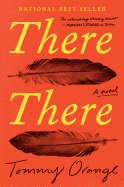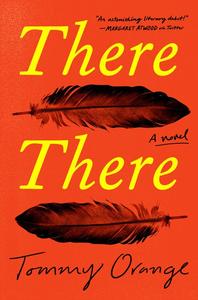
 In Tommy Orange's brilliant debut novel, There There, 12 people, primarily urban Cheyenne, move toward convergence to attend a big powwow in Oakland--most eagerly, some warily. "We made powwows because we needed a place to be together. We all came... for different reasons. The messy, dangling strands of our lives got pulled into a braid... layered in prayer and hand woven regalia, beaded and sewn together, feathered, braided, blessed and cursed." But the epigraph from Bertolt Brecht hints at something shadowy: "In the dark times/ Will there be singing?/ Yes, there will also be singing/ About the dark times."
In Tommy Orange's brilliant debut novel, There There, 12 people, primarily urban Cheyenne, move toward convergence to attend a big powwow in Oakland--most eagerly, some warily. "We made powwows because we needed a place to be together. We all came... for different reasons. The messy, dangling strands of our lives got pulled into a braid... layered in prayer and hand woven regalia, beaded and sewn together, feathered, braided, blessed and cursed." But the epigraph from Bertolt Brecht hints at something shadowy: "In the dark times/ Will there be singing?/ Yes, there will also be singing/ About the dark times."
Buzzfeed called the prologue an urban Native manifesto, an encapsulation of Native history from America's initial colonization. "Getting us to cities was supposed to be the final, necessary step in our assimilation, absorption, erasure, completion of a five hundred year old genocidal campaign. But the city made us new, and we made it ours.... We found each other."
Tony Loneman begins the interwoven stories. He has fetal alcohol syndrome, which he calls the Drome. His eyes droop, his mouth hangs open. But he's tall, he's strong, he makes "looking like a monster" work for him. Dene Oxendene is recording urban Native stories--"the individual people... are not pathetic or weak or in need of pity, and there is real passion there, and rage."
Edwin Black is biracial. He made it through grad school, writing his thesis on the influence of blood quantum policies on modern Native identity and literature written by mixed-blood Native authors. "All without knowing my tribe. Always defending myself. Like I'm not Native enough.... I don't know how to be."
Opal Violet Victoria Bear Shield goes to the powwow to watch her young nephew, Orvil, who has learned to dance watching YouTube videos. The first time he had seen a Native dancer, "he knew. He was a part of something. Something you could dance to." Opal's sister, Jacquie Red Feather, a substance abuse counselor, is also on her way to the powwow, 10 days sober.
Thomas Frank is a drummer. He carries a chip on his shoulder so heavy it makes him lean. "A concrete chip, a slab really, heavy on one side, the half-side, the side not white.... You're from a people who took and took and took and took. And from a people taken."
There There is a fierce story of despair, addiction, recovery and hope, with moments of sweetness and humor. Orange asks what it means to be Indian, Native, biracial--how is identity parsed? In the Gertrude Stein sense, "there is no there there" connotes the absence of homeland. For Orange's people, Oakland is a new "there." His title is also a promise of comfort, but one that proves elusive.
Tommy Orange has written a bold, passionate book that stabs you in the heart. --Marilyn Dahl
Shelf Talker: There There, a powerful novel about urban Native Americans, is underlain with a drumbeat of sadness and conflict, but threaded with hope.

